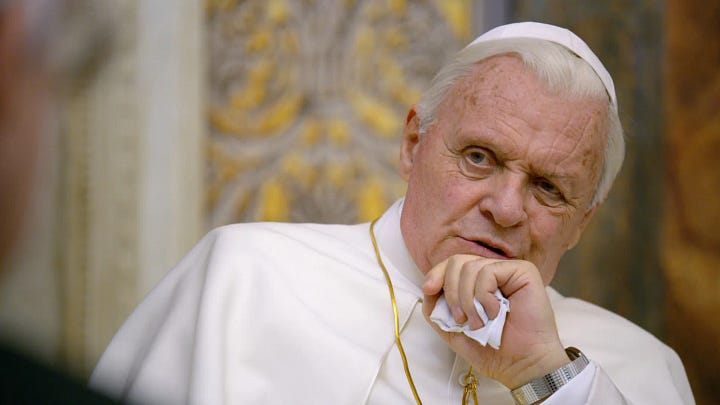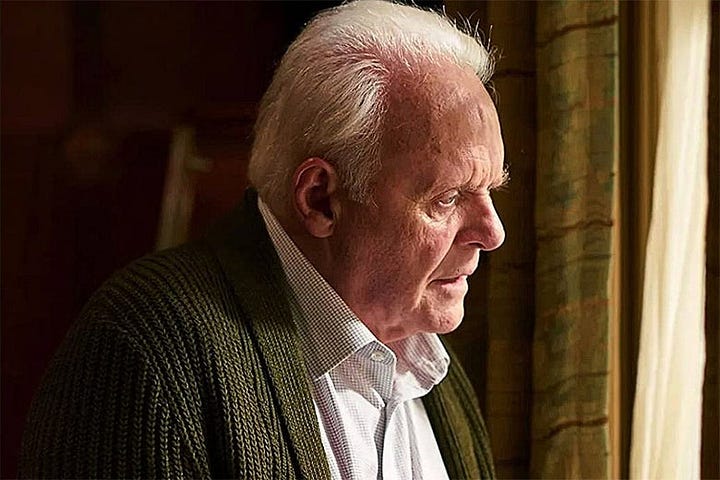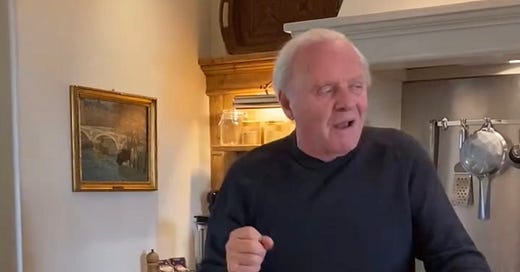A Native American proverb tells us that “no wise person ever wanted to be younger.” If that is true, then Anthony Hopkins’s Instagram could make a wise person — and a happy person — out of anyone. To his 5.2 million followers, the two-time Academy Award winning actor from Wales shows snippets of a life overflowing with curiosity, friendship, and joy. One day, he can be seen dancing the rumba in his kitchen or playing the piano in an empty hotel lobby; the next, he is reciting Prufrock on a winter stroll in London. Whether quoting Shakespeare or celebrating his nearly 50 years of sobriety, he imbues each glimpse into his life with gratitude and wonder. “Life is in session,” he urged us last December in a post marking his 48th year without alcohol. “Go for it.”
Up until the mid-nineteenth century, most Americans did not celebrate their birthdays, and many had no idea when they were even born. By contrast, Americans today are obsessed with age. Every year, we seek new dyes, regimens, and procedures to cling to youth, fueling a massive anti-aging market that’s expected to reach $93 billion by 2027. At the same time, our attitudes toward the elderly have morphed from deferential to indifferent to downright hostile. Far from being revered for their wisdom and experience, seniors today are too often belittled as forgetful and cantankerous “geezers” who spend their days playing bingo, spewing nonsense on Facebook, or butt-dialing their grandkids.
In short, age gives us the heebie-jeebies, giving us little incentive to socialize with those who are older than us. A 2023 study found that, for a group of young adults under the age of thirty, more than 80 percent of the people in their social circles were born within five years of them. Assessing a broader age range, another 2019 survey revealed that nearly two-thirds of adults do not have any close friends who are at least fifteen years older or younger than them. This self-segregation has made ageism not only incredibly widespread — one in two people hold ageist attitudes toward older people, the UN reports — but also socially permissible. Together, we stereotype elder individuals as a monolith — assuming they all have an unwillingness to adapt or learn — before pushing them out of their jobs and into "facilities" where few of us would opt to spend our time.
Months have passed, and still I cannot get over the ageism exhibited last summer, when Joe Biden made the decision to exit the presidential race. Certainly, many of the concerns surrounding Biden’s age were valid. Yet as a young person who spends considerable time with people in their eighties and nineties, I found much of the commentary to be mean-spirited and vulgar, at times even cruel. For weeks, I watched as members of the press ridiculed Biden as a “ghostly” “shadow" with an “agape” mouth and “stammering” voice, unable to “function” as he wandered into a state of “sepulchral” “senselessness" — as though he were somehow already dead. At times, it was hard not to wonder whether the most callous of takes reflected genuine concern about Biden’s age or something else entirely.
Five years older than Biden, Anthony Hopkins offers us another way. Whether embodying a disgraced pope, a famed psychoanalyst, or a father stricken with dementia, the actor continues to deliver performances that are as delightful as they are haunting, illuminating universal (and at times uncomfortable) truths about what it means to be human.


On social media, Hopkins is more playful, even goofier. Dressed in a Hawaiian shirt, the actor treats us to Drake dances, cat selfies, and water aerobics classes alongside impersonations of Sylvester Stallone, Arnold Schwarzenegger, and the Easter Bunny. His zest for life suggests a deep communion with his inner child as well as a willingness to self-interrogate and grow. It is a zest that I see at the retirement community by my house where residents put on plays and host discussions of new movies, as well as my church where I’m a member of a book club with a median membership age of eighty. First strangers and now friends, the members of this club have changed the way I look at everything from A Wrinkle in Time to The Covenant of Water, leaving me with a deepened appreciation of experience, a greater reverence for the past, and renewed hope for the future.
At first glance, Anthony Hopkins’s Instagram might appear unrealistic or unachievable — he is Anthony Hopkins, after all. Yet it is evident that something is resonating at a time when we really need it. Between 2000 and 2040, the number of people 85 and older is expected to quadruple; and by 2034, older adults in the U.S. will outnumber children for the first time in history. Clearly, we need to adopt a less stereotyped and more optimistic mindset about getting older — a type of mindset that will lead to not only less generational prejudice, but also better health outcomes and longer lifespans.
Part myth debunker and part role model, Anthony Hopkins is a living, breathing embodiment of this sort of thinking. Whether on screen or on social media, he makes old age look a lot less scary and a lot more fun. In doing so, he invites us all to take off our masks. Bit by bit, he peels off the layers of retinol and Botox, revealing a uniting truth: That we are all human, all mortal, and all capable of change.
How lucky are those who make it to old age. And how lucky are we to know them.
Thank you so much for reading.
Your friend and fellow traveler,
How to support
LINKAGE is a free, all-access newsletter, but I would be eternally grateful if you would share it with a friend and/or follow me on Instagram here.






Thank you for this, Cornelia! It really resonated with me. I have close friends who are as much as 30 years younger and some 20+ years older than me and I feel so lucky. I get to be the old geezer with the parenting advice to my young friends and the spring chicken soaking up all that wisdom from my older friends.
It’s all closer in time than we believe it to be. Thank you for the lovely article.
John Connolly